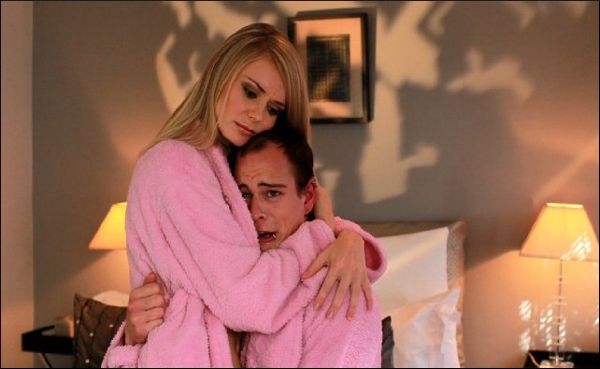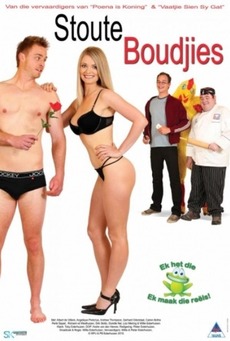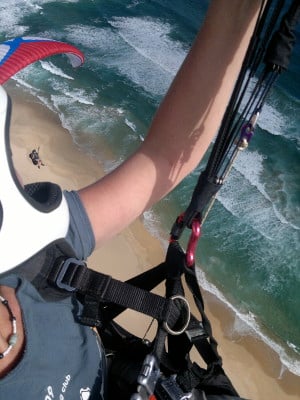The hilarious romantic comedy Stoute Boudjies was written and directed by actor, director, writer, producer, and editor Willie Esterhuizen. Throughout his career, Esterhuizen has won a Star Tonight Award for Best Writer, an Avanti Award for Best Actor, Best Comedy Production, and Best Writer, and a Golden Loerie Award in the TV Advertisement category. The title Stoute Boudjies combines the words “stout,” meaning “naughty,” and “boud,” meaning “rump” or “buttocks,” while “jies” suggests a diminutive form, which Afrikaners love using as a term of endearment.
As a prelude to the movie, there is an artistic slide-show showing provocative close-ups of various buttocks clad in g-strings, leaving no room for error as to what “stoute boudjies” is meant to suggest. To eliminate any further confusion, the film’s poster displays an insert of a smiling frog next to the phrase, “I have the frog, I make the rules!” This is nonsensical in English, but in Afrikaans the most innocent terms can easily become lewd words, without resorting to actual verbal vulgarity at all. In this case, the term “frog,” or “padda,” is commonly taught to baby girls, and it refers to their private parts. The movie brings to light much of the lingo that is frequently used by Afrikaners today. “Doos,” for example, means “box” or “container,” but today is commonly employed as a derogatory adjective referring to female private parts; while “naai” means “sewing,” but nowadays refers to “having sexual intercourse.” Angelique Pretorius, who plays the role of Petro, is seen modeling her black underwear and stilettos, while Albert de Villiers is Hardus Vogel. In Afrikaans, Vogel is “Voël,” which directly translates into “bird,” though the word can also be used to refer to male genitalia. As for “Hardus,” well...
"In Afrikaans the most innocent terms can easily become lewd words, without resorting to actual verbal vulgarity at all"
Stoute Boudjies begins with helicopter pilots receiving the command to give up a search and rescue mission until weather conditions improve. We are then introduced to a pair of youngsters on a raft bursting into tears, admitting that they want to “bekak” themselves, a common South African slang term which means that the characters are so afraid that they want to “defecate.” Hardus then wakes up, and we realize that his reality is not much better than his nightmare. His mother raises him by herself, since his father deserted the family for a Russian blonde, and his school has closed, which forces him to find a job. After a failed attempt at becoming a sperm donor, Hardus eventually finds employment as a walking advert, but he gets himself into an argument with a biker and loses his job. Petro comes to his rescue, taking him to the safety of her house, where he loses his virginity to her. The Afrikaans expression for this is “ontblom,” which means “deflower,” and Hardus, being the typical virgin youngster, takes a photograph of this wonderful event and publishes it on his Facebook profile as “My ontblomming.”

We then see that the biker, who cost Hardus his job, arrives at Petro’s house and is, in fact, her boyfriend. Hardus immediately flees, leaving his clothes behind and speeding away naked, only to be stopped by a Xhosa female traffic officer. Hardus attempts to explain to the officer that he lost his virginity, using the term “Pata Pata,” which refers to a song first recorded by Miriam Makeba in 1957 and which has since become a common South African term describing any promiscuous behavior. Hardus then thanks the traffic officer for allowing him to leave with a stern warning, but then he refers to her as an “ousie,” which is a derogatory term derived from the Apartheid era. “Ou” means “old,” and “sie” is the diminutive form. “Ousie,” then, refers to domestic servants, not only housekeepers but also elderly people who take care of children. There are many such colloquial terms used in this movie. A South African favorite is “lekker,” an Afrikaans adjective meaning “delightful” or “exciting.” Even English-speaking South Africans have adopted this word. Another widely used term is “suip,” which refers to an animal drinking and suggests a human drinking in order to become heavily intoxicated.
In a twist of fate, Hardus’s friend, Vaaitjie, offers him employment washing the kitchen at De Vries Bakery. When both boys make a delivery to Prince Omar in the city of Durban, they discover an enormous stash of cocaine on the Prince’s yacht. Prince Omar orders his bodyguard to make Hardus and Vaaitjie permanently disappear, and Vaaitjie begs him to pay them for the delivery and let them disappear on their own. Prince Omar responds in Afrikaans, and Hardus comments that the Prince can speak Afrikaans just like a “Capie,” which refers to the dialect used by Cape Coloureds (it should be noted that, in South Africa, the term “coloured” is neutral, without the negative connotations it holds in the West, and specifically describes an ethnic group of mixed European and African ancestry).
Petro and another friend of Hardus trace the missing youngsters’ phones to an Indian cell-phone dealer in Durban. The movie shows the city’s beautiful scenic coastline and topless tourist bus, but also portrays a South African Indian as a cell-phone dealer, since Durban has a large Indian population. The term “charra,” which is used to refer to the dealer, is a common derogatory term for South African Indians. The National Sea Rescue Institution sends out a search party for Hardus and Vaaitjie, but because of weather and lack of personnel, the search is delayed, which points back to the nightmare at the beginning of the film.



